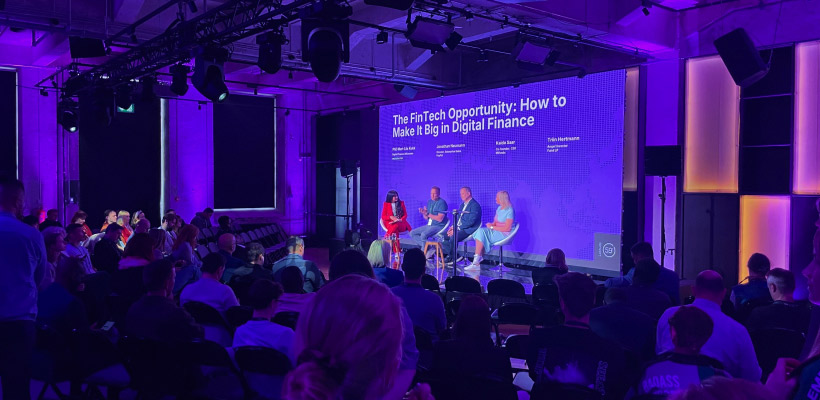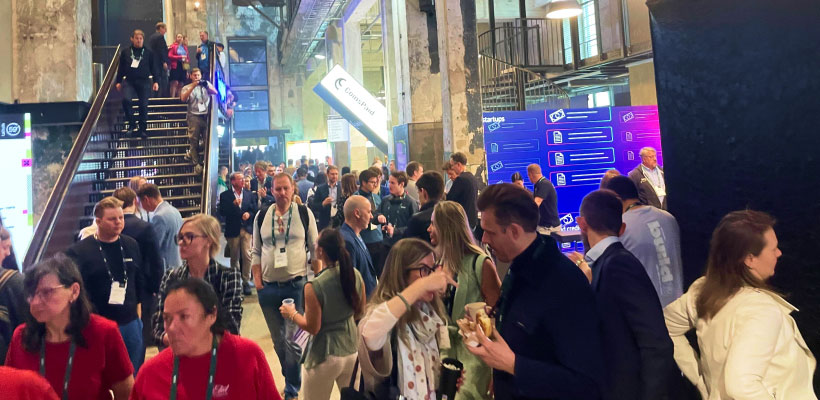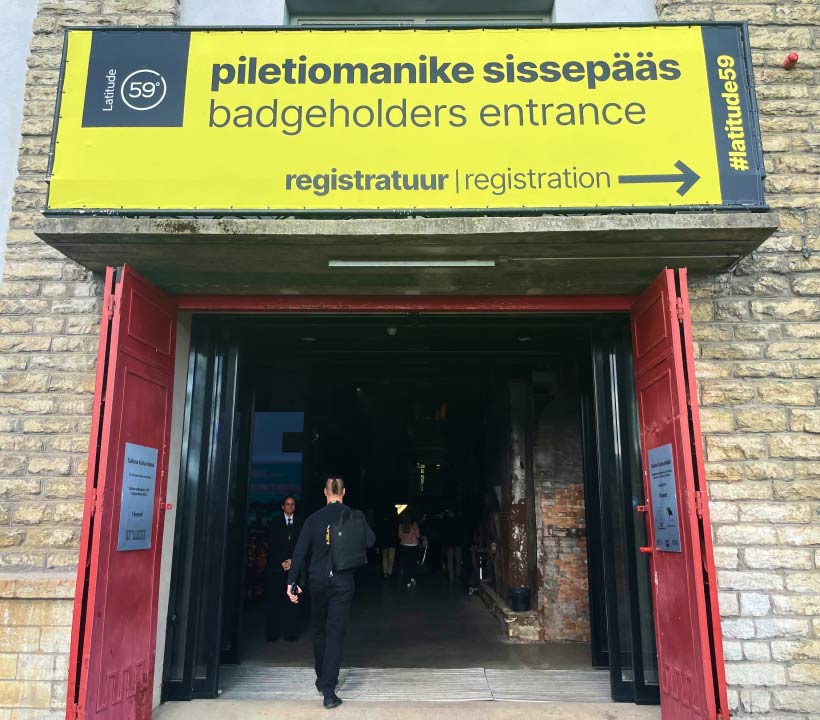3500 participants from 70 countries, 900 startuppers, 700 investors, 116 speakers, 47 side events — Light IT Global couldn’t miss one of the biggest and the most influential tech events in Baltics.
This year our journey to Latitude59 was full of pleasant surprises, exciting acquaintances, raw emotions, and, of course, thought-provoking insights. So if you somehow missed this year’s “Davos for startups”, we’ve gathered some of the most interesting bits from the conference and packed them all into this article. Dive in!
“Action Always Cures Fear”. Defence Tech Is On The Rise.
The theme of security, technological dependency, and the importance of faster defence tech development and adoption was one of the most discussed this year. Not really surprising, if you take into consideration the ongoing war Russia started in the heart of Europe years ago and the unpredictable US policy towards Europe.
The former president of Estonia Toomas Hendrik Ilves highlighted the growing tech reliance of European countries on the United States and China.

“Today security really is fundamentally a technology question, so if we fall behind we have to rely on foreign technology. Now we see the United States cutting off say Maxar which provided Ukraine with battlefield maps in real time. We see other cut offs from the United States in the tech realm and we have to really start worrying about our own security. If we don't produce these things ourselves we're going to be at other people's mercy.”
“We are living in a far more dangerous world than we have lived in 1991. We're already almost 11 years since we saw the first post World War II case of aggression. Nothing has been done on that.
We see an aggressive Russia which when this war is over is going to have millions of people with PTSD coming back from the front and they have a war economy that is only geared towards producing war material. What are they going to do after that?
Across the Atlantic we have a Europobic general attitude and we cannot really count on the United States the way we have since 1945. And then we have on top of that a rising China that we all worry about. What happens if they take a clue from Crimea and Ukraine and decide to invade Taiwan?
So when you cannot be sure about your own security, then you better start dealing with things that prevent you from having security. That is what happens these days: lack of innovation, lack of technology, inefficient economies… We are snoozing constantly, we are too slow to change, and I think we really need people to wake up also to this new reality when it comes to the defense industry.”
Grace Cassy, a co-founder at CyLon Ventures, provided us with a sneak peek into the UK’s 2025 Strategic Defence Review. She mentioned that after the US removed its security umbrella from Europe, defense technology received a significant boost in investment, both from the private and government sectors. Such a shift of interest is also driven by a dramatic example of the change in the battlefield, as the whole world sees how it has become cognitive and automated.

Grace emphasized the UK’s commitment to create a UK Defense Innovation Agency and to spend 10% of its defence equipment budget on novel technology. This is great news for defence tech startups that can’t typically access sky-high budgets allocated towards more traditional defence mechanisms.
However, it not only means that interest in military technology has heightened, but it also means that Europe requires innovative solutions to function long-term in a hostile environment. It results in a need for resilient and secure communications and networks, a stronger emphasis on cybersecurity, and a stronger emphasis on supporting critical national infrastructure (particularly undersea critical infrastructure, which is highly vulnerable). To achieve this, European investors interested in defence tech emphasize the importance of interoperability, simple software architecture, uninterrupted data exchange, and easy integrations.

Speakers who took part in a panel dedicated to the issue of slow innovation adoption in defence tech emphasized the main issues European IT and legislation need to focus on:
- Defence tech disincentivization. In the last 30 years Europe has built infrastructure to demilitarize itself, and then we're somehow surprised that people don't want to invest in here and don't want to associate their careers with defense.
- European armed forces and procurement agencies are not used to fast-paced decision-making and cooperation, which is necessary today, especially when it comes to innovation adoption.
- Complicated delivery at scale. Many defence tech companies offer innovative solutions but produce only hundreds of systems, which isn’t enough to meet the needs of the armed forces of a country, let alone the EU.
- The necessity to cut the red tape to facilitate the delivery of tangible results in defence and increase the speed of technological innovation adoption across Europe.
The topic of an unnecessarily complex regulatory landscape was discussed not only from the POV of startuppers and investors working in defence. The problems related to regulatory fragmentation unite all the entrepreneurs regardless of their business niche. That’s why several discussions were dedicated to EU legislation & regulation for startups and scaleups.
Overcoming Regulatory Barriers Through Structural Reforms
A presentation of 28th regime by Carolina Rossi from ESNA was one of the most inspiring discussions at Latitude59 this year. This optional EU-wide legal framework is designed to streamline market access, enhance legal certainty, and boost cross-border competitiveness for startups and scaleups in the EU.
As Luis Roquette Geraldes from ESNA noted, the 28th regime can provide the EU with an opportunity to get a a single corporate point of entry and an effective EU-wide investment documentation. Consequently, the fundraising process for startups will be streamlined, which, in its turn, will fuel healthy competition among businesses from different corners of Europe.

Moreover, in his opinion, Trump’s presidency has provided Europe with the sense of urgency that shouldn’t be lost but instead used to promote vital legal changes as quickly as possible.
Former Deputy Minister at the Ministry of Economy & Innovation of Lithuania, Egle Markeviciute, also made a valid point that European startuppers, investors, and innovators should take a more active part in EU-level policymaking at European Commission as today many consider it as something of no avail.
In Luis Roquette Geraldes’ opinion the key is to achieve an optimal level of harmonization (around 70-80%) and stop the European bashing as even though EU has some adequate legal initiatives (like GDPR or AI Act) it still loses the competition to the US missing out on the most promising tech innovations and talent. And if Europe will not put effort into the creation of a comfortable and fair legislative environment for startups and scaleups, in the next 5-10 years it can waste its innovative potential completely and become irrelevant on the global market.
Agentic AI Is The Next Big Thing In The Tech World
Several panels at Latitude59 were dedicated to AI. And while AI-centered discussions became the new norm for tech events across the world, in Tallinn the focus shifted from conversational to Agentic AI and its influence on modern startups and scaleups.
If you’re not familiar with the concept of Agentic AI, it’s a subdivision of Artificial Intelligence that is more autonomous and capable of taking actions or making decisions on behalf of the user or an organization. This type of AI operates with a higher level of agency, meaning it can not only interact with users but also act independently to achieve specific goals.
What does the growing popularity of Agentic AI mean for entrepreneurs in Europe and beyond? Several things, actually.
- Using AI agents is the new way to resolve pressing business issues more efficiently, not the goal itself, even though mentioning the use of Agentic AI will most definitely attract investors’ attention during the next several years.
- While the fear of job loss or AI replacement is real for many employees working in companies willing to adopt innovative AI-based solutions, the AI boom also facilitates the creation of new high-value professions and jobs across different industries.
- 2025 isn’t the time for AI skepticism. Those who underestimate the transformative potential of AI and its ability to help businesses achieve their goals faster and in a more efficient way are essentially replaced by those who know how to get the most out of available AI-powered tools.
- With the rise of AI agents, the majority of modern software will be redundant as it will have to be built for agents and not for humans like it is today.
So, should we be excited or scared about Agentic AI, which represents another step toward a superintelligence that will eventually surpass humans? The speakers at Latitude59 remain technologically optimistic, emphasizing how much more effective a more autonomous AI can be. However, it will still remain unclear for some time whether this innovation will lead to a utopian or dystopian scenario. Guess, we’ll have to stick around and see it for ourselves!



